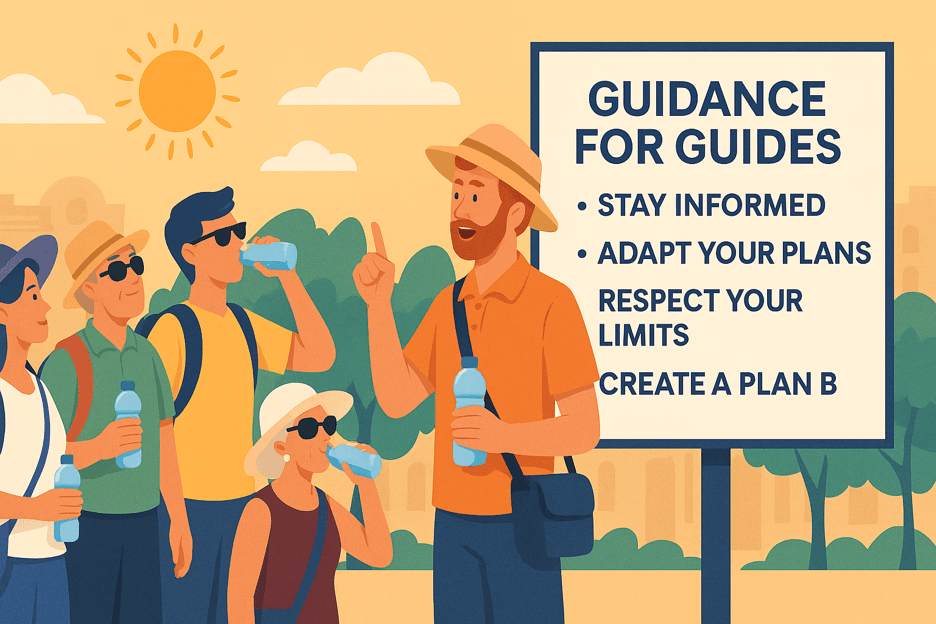As heatwaves across Europe intensify, our responsibility as tourist guides grows – not just toward our guests, but also toward ourselves. Extreme heat is no longer an exception; it is a new reality that demands attention, adaptation, and solidarity within our profession.
In these challenging conditions, the role of licensed and well-trained guides, especially those connected through professional associations, becomes even more vital. Guides who are part of such networks have access to up-to-date safety alerts, peer support, legal advice, and practical resources to help them adapt quickly and responsibly.
“In times like these, professional guiding means more than delivering a tour. It means caring – for your guests, your colleagues, and your own health.”
— Sebastian Frankenberger, WFTGA President
Guidance for Guides: Practical and Professional Action
WFTGA encourages all tourist guides to act proactively and responsibly in the face of high temperatures. The following measures can help you reduce risk, protect your groups, and preserve your well-being:
Stay informed: Monitor official weather and health warnings.
Communicate early: Coordinate with agencies, operators, and guests in advance. Be transparent about risks and possible changes.
Adapt your plans: Consider earlier start times, shorter routes, increased shade and rest stops, and access to water.
Create a Plan B: Develop alternatives – indoor options, cancellations, or finding a replacement guide if conditions exceed your capacity.
Respect your own limits: Guiding in extreme heat is mentally and physically demanding. Speaking, managing groups, and staying alert all require energy. Your health must never come second to performance.
Legal and Insurance Considerations
We strongly advise all guides to review their liability insurance policies. Specifically:
Check whether your insurance covers cancellations or modifications due to heat warnings.
Understand under which circumstances your actions could be considered gross negligence – such as ignoring official alerts, failing to adjust your tour, or neglecting vulnerable participants.
When in doubt, document your risk assessment and your safety adaptations. Professional conduct protects you legally as well as ethically.
When Cancelling Becomes the Right Choice
There may be moments when, for safety reasons, a tour must be postponed or cancelled entirely. This is not a failure – it is a professional judgement. If possible, work with your network to find a substitute guide who may be less affected by the heat or better suited to continue the tour under the conditions.
Remember: heat affects people differently. Older guides, or those with health conditions, must be especially cautious. Caring for yourself is not selfish – it is responsible leadership.
A Final Word
Extreme heat challenges us – but it also reveals our strength as a global community of guides. Through preparedness, communication, and mutual respect, we can meet this challenge professionally and with care.
At WFTGA, we continue to stand by you – with resources, advocacy, and a shared commitment to guide responsibly, in every sense of the word.
And perhaps, beyond adaptation and safety, this moment also calls us to reflection.
The rising heat is not a coincidence – it is a symptom. As professional guides, we are in a unique position to gently raise awareness of climate change and its effects on people, places, and heritage. We believe it is part of our ethical responsibility to integrate these topics – with care and sensitivity – into our narratives and encounters.
By fostering understanding and encouraging action, we help shape not only better tours, but a better future.

